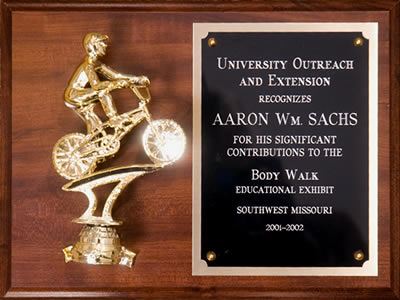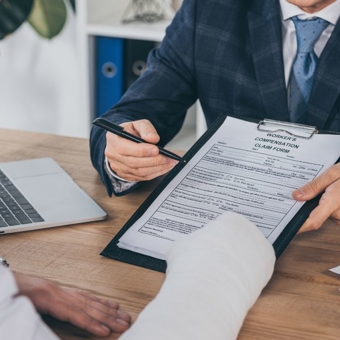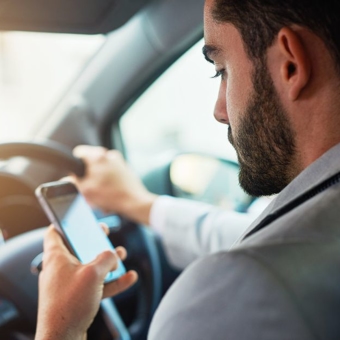
Safety Helmet Program
Helping to protect children throughout Missouri
As part of Aaron Sachs & Associates, P.C.’s commitment to community service and child safety, we proudly participate in a child safety helmet program that provides low- or no-cost bike safety helmets to Missouri children. We are excited to celebrate 25 years of helmet safety with this program, which has handed out around 40,000 helmets to date!
Currently, we have children’s helmets available for pickup at our Springfield and Joplin offices (while supplies last). Please call ahead to schedule a visit between 8:00 AM and 5:00 PM, Monday through Friday. Dial (888) 287-1046 to see if we have a helmet available for your child. If you catch us at the KY3 First Alert Weather Tour or the Neighborhood Block Party this fall, we will have some helmets available for pickup, too.
Helmets Save Lives
Americans are increasingly bicycling to commute, for exercise, or just for fun. By law, bicycles on the roadway are vehicles with the same rights and responsibilities as motorized vehicles. Unfortunately, not every driver considers it that way, so bicycle accidents happen all the time.
Based on information from the National Highway Traffic Safety Administration (NHTSA), nearly 1,000 bicyclists die and over 130,000 are injured in crashes that occur on roads in the United States every year. As you might expect, when a crash occurs between a vehicle and a bike, it’s the cyclist who is most likely to be injured.
To reduce the risk of serious head injuries, every bike ride should begin with putting on a helmet. But it’s important that you ensure a proper fit so your helmet can best protect you. Size can vary between manufacturers, so always follow the steps to fit a helmet properly. While adjusting the straps, look in the mirror or have someone else make adjustments for you. It may take time to ensure a proper helmet fit, but your life is worth it.
Be Prepared Before Heading Out
Before you start your next bike ride or let your child head out for a bicycle ride with friends, take a little bit of time to make sure everyone is prepared for the ride ahead. Safety first, fun second — because it’s no fun when there’s a bicycle accident.
Preparations to consider before you head out on your bicycle should include:
- Ride a bike that fits you—if it’s too big, it’s harder to control the bike.
- Ride a bike that works—it really doesn’t matter how well you ride if the brakes don’t work.
- Wear equipment to protect you and make you more visible to others, like a bike helmet, bright clothing (during the day and night), reflective gear, white front light red, rear light, and reflectors on your bike (at night or when visibility is poor).
- It’s worth saying again, “Wear a properly fitted bicycle helmet whenever you ride.”
- Ride one per seat, with both hands on the handlebars, unless signaling a turn.
- Carry all items in a backpack or strapped to the back of the bike.
- Tuck and tie your shoelaces and pant legs so they don’t get caught in your bike chain.
- Plan your route—if driving as a vehicle on the road, choose routes with less traffic and slower speeds. Your safest route may be away from traffic altogether, such as in a bike lane or on a bike path.
Bike Defensively, Alertly & Focused
Be focused and alert to the road and all traffic around you when you are riding your bicycle. Anticipate what others may do before they do it. This is defensive driving or biking—the quicker you notice a potential conflict, the quicker you can act to avoid a potential crash.
To bike defensively, you should:
- Bike with the flow, in the same direction as traffic.
- Obey street signs, signals, and road markings, just like a car.
- Use bicycle lanes and paths where available.
- Assume the other person doesn’t see you; look ahead for hazards or situations to avoid that may cause you to fall, like toys, pebbles, potholes, grates, train tracks, etc.
- Don’t listen to music or use anything that distracts you by taking your eyes, ears, and mind off the road and traffic.
Bike Predictably & Avoid Sidewalks
By biking predictably, motorists can get a sense of what you intend to do and can react to avoid a crash. Bike where you are expected to be seen, travel in the same direction as traffic, and signal and look over your shoulder before changing lane position or turning. The law considers a bicycle a vehicle, so you should think as if you are one.
Avoid or minimize sidewalk riding. Cars don’t expect to see moving traffic on a sidewalk and don’t look for you when backing out of a driveway or turning. Sidewalks sometimes end unexpectedly, forcing the bicyclist into a road when a car isn’t expecting to look for a bicyclist.
If you must ride on the sidewalk remember to:
- Watch for pedestrians.
- Pass pedestrians with care by first announcing “on your left/right” or “passing on your left/right” or using a bell.
- Ride in the same direction as traffic. This way, if the sidewalk ends, you are already riding with the flow of traffic. If crossing a street, motorists will look left, right, and left again for traffic. When you are to the driver’s left, the driver is more likely to see you.
- Slow and look for traffic (left-right-left and behind) when crossing a street from a sidewalk; be prepared to stop and follow the pedestrian signals.
- Slow down and look for cars backing out of driveways or turning.
Improve Your Riding Skills
No one learns to drive a vehicle safely without practice and experience, and safely riding your bike in traffic requires the same preparation. Start by riding your bike in a safe environment away from traffic (a park, path, or empty parking lot).
Check local schools, parks, bike shops, and safety groups to see if you can sign up for a bicycle safety and handling course. Confidence in traffic comes with learning how to navigate and communicate with other drivers, bicyclists, and pedestrians. If you bicycle to commute to work or school, start bicycling for recreation in your free time, too. The more time you spend on a bicycle, the better you’ll be at handling it and recognizing traffic patterns, so you can stay safe.
Letters of Thanks
Thank you for making the helmet program available to all individuals ...
Thank you from TCTI
Thank you for your donation of the helmets ...
Texas County Technical College Practical Nursing students
Texas County Technical College Practical Nursing students are standing in front of bike helmets donated by the law firm of Aaron Sachs & Associates, P.C. Springfield, MO ...
Thank you from Michelle B.
Thank you so much for the bike helmets that you donated to Cowden Elementary Prime Time ...
Thank you from Marshfield Chiropractic
Thank you for for being a helmet sponsor for the 2010 Safety on Wheels Event ...
Thank you ...
Thank you for the outstanding bike helmet
Thank you so much for contributing to your community!
The Logan-Rogersville Wildcat Reading Club met on March 2nd to learn about bicycles, bicycle equipment, and bicycle safety.
A Huge "Thank You"
Thank you for making the helmet program possible ...
"Thank You from Oswego-Troop 70142"
Thank you for providing the greatly appreciated bicycle helmets ...
Community Service Commitment
Life should be about helping others.
Child Helmet Public Service Announcements
Since 1998, the firm has teamed up with several other charitable organizations and schools to promote helmet safety. Aaron Sachs himself is a member of the Brain Injury Association of Missouri and has participated in making public service announcements about bicycle safety and child safety helmets.








Our Testimonials
-
“My husband was in a car accident, we called Aaron Sachs, and are very glad we did! First of all, they sent someone to our home to interview my husband, so he did not have to drive all the way to Springfield to their office while he was in pain.”Former Client
-
“I was rear-ended by a non-insured driver. My car was totaled and I ended up having surgery on my shoulder. I was thrilled to get a settlement way larger than I could have dreamed.”Former Client


Updates & Articles
Useful Guidance on Frequently Asked Questions After Being in an Accident
-
 What Happens If You Can’t Go Back to Work After an Injury?Read More
What Happens If You Can’t Go Back to Work After an Injury?Read More -
 Can You Sue a Bar for a Drunk Driving Accident?Read More
Can You Sue a Bar for a Drunk Driving Accident?Read More -
 How Long Do I Have to File a Workers' Compensation Claim After an Injury?Read More
How Long Do I Have to File a Workers' Compensation Claim After an Injury?Read More -
 Common Causes of Car Accidents & Who's At FaultRead More
Common Causes of Car Accidents & Who's At FaultRead More -
 DUI Rates Go Up Around the Holidays: Here's What to Do If You Were Injured By a Drunk DriverRead More
DUI Rates Go Up Around the Holidays: Here's What to Do If You Were Injured By a Drunk DriverRead More -
 Am I Eligible for Workers' Compensation If I Was Injured at a Company Holiday Party?Read More
Am I Eligible for Workers' Compensation If I Was Injured at a Company Holiday Party?Read More





